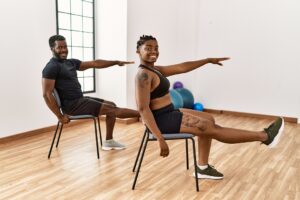
Chair yoga is a safe, effective, low-impact intervention that can be practiced sitting or standing using a chair for support. It combines balance, flexibility, breathing, relaxation, mindfulness, and balance and is an excellent non-pharmacological approach to treating seniors with dementia.
Many senior and community centers offer chair yoga, but the recent pandemic has created many barriers for seniors to attend. Lack of transportation, relying on caregivers, and living in rural areas can also restrict seniors from attending classes. These burdens have created a need for innovative ways to deliver chair yoga to those who can’t travel to an in-person class.
A recent study published in the journal Complimentary Therapies in Clinical Practice involved evaluating whether virtual chair yoga could be used as a valuable intervention for seniors who could not attend in-person classes. This remotely supervised online chair yoga intervention was targeted at adults with dementia while researchers measured clinical outcomes virtually via Zoom.
Researchers assessed the feasibility of this intervention and analyzed the relationship between chair yoga and the outcomes of pain interference, mobility, risk of falling, sleep disturbance, autonomic reactivity, and loneliness.
All participants in the study took part in a 60-minute session twice a week for eight weeks. During the chair yoga sessions, the participants were to follow along with an instructor who was spotlighted on the Zoom screen, allowing participants to only see the interventionist. This allowed participants to focus on the yoga sessions without being distracted by other participants on the screen. Participants also interacted with other participants or the facilitator over Zoom to maintain social bonds while maintaining a physical distance.
Researchers found that the telehealth-based chair yoga intervention was convenient for participants and their caregivers because it was easily accessible from home. Participants did not need transportation, and it didn’t even require them to get dressed, which reduced caregiver burden and stress.
Overall, virtual chair yoga classes were able to “Provide a means of reducing health disparities by opening access to interventions for persons who are unable to travel to a clinic or facility,” said Lisa Ann Kirk Wiese, Ph.D., co-author of the study.
“An important feature of our technology-based intervention is that it could allow socially isolated older adults with dementia who are living at home, especially those in underserved communities where people are becoming more digitally connected, to receive remotely supervised chair yoga that provides physical, social and psychological benefits.”
Cognitive Decline
While some degree of cognitive decline is nearly inevitable as you age, some steps can be taken to help reduce the risk of cognitive decline and dementia, including eating a healthy diet, getting proper exercise, and staying social.
One simple step in helping reduce cognitive decline symptoms include getting proper vitamins and nutrients. Ensuring the body gets what it needs can affect memory, concentration, and overall brain function.
The Smart Pill can help to enhance cognitive function and memory through 9 ingredients that help to support, nourish, and maximize brain health. These include ginkgo biloba, huperzine A, bacopa extract, rosemary extract, and a B vitamin complex. The formulation of these ingredients is an excellent way to help fight free radicals, boost circulation, and provide nutritional support to assist with cognitive function.